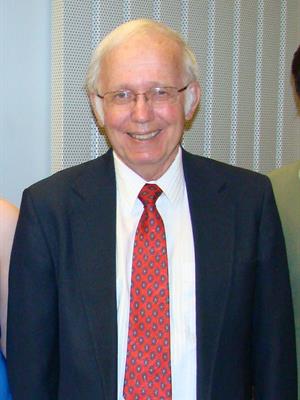
Daniel F. Callahan, historian of medieval Europe, passed away on January 25, 2024. Until his retirement in 2019, he was a longtime professor of history (then professor emeritus) at the University of Delaware. More than that, he was a thoughtful scholar, a dedicated teacher, and an exceedingly generous colleague.
Born in Boston in 1939, he attended Saint John’s Seminary in Brighton, Massachusetts, then moved to Boston College and received his MA in 1965. He earned his PhD in 1968 at the University of Wisconsin–Madison, advised by David Herlihy.
Beginning with his dissertation, Dan’s research revolved around a mercurial 11th-century monk from southern France named Ademar of Chabannes. Through the lens of Ademar and Aquitaine, Dan’s research illuminated aspects of the utility of sermons as sources, the cult of the saints, how apocalyptic expectation shaped lived experience in the 11th century, the power of medieval forgery, the roots of European anti-Jewish violence, the legacy of Charlemagne in the centuries after his death, and the rebirth of heresy in the West. Dan’s monograph, Jerusalem and the Cross in the Life and Writings of Ademar of Chabannes (Brill, 2016), was the culmination of a life’s work. Reviewed as “thoughtful and deeply learned,” it threaded so many disparate strands into a compelling analysis of the pull that the terrestrial Jerusalem had on the monks of medieval Europe.
The authors of this piece were fortunate to have had the opportunity to present Dan with a Festschrift celebrating his work in 2014. This collection, filled with essays from admirers, friends, and students, tried to emulate the skill that Dan had in building outward from something (seemingly) small—of finding meaning in a text, of using the paucity of medieval sources to illuminate a much wider, more colorful, more fully human world. As so many of the volume’s contributors wrote, the intellectual generosity of Dan’s scholarship always opened up more questions, becoming on-ramps to further research not just for himself but for a wider intellectual community.
This generosity was a consistent theme with Dan. His generosity, his intellectual caritas (if you will), manifested, too, in his teaching. He had an amazing ability, even in a large lecture, to ensure that all his students knew they were being taken seriously, that everyone in that room was on a shared journey, and that the purpose of the classroom was about building knowledge together. That generosity was also manifested in his mentorship and how he steered countless students, including both of us at different stages of our respective careers, through a medieval world that at times both entranced and bedeviled us. He indulged flights of intellectual fancy and gladly took on graduate students working in areas outside his immediate interests. A scholar of the 10th and 11th centuries, in his later years, he nonetheless confessed a secret admiration for the 13th. Once, while admonishing one of us to not just read but rather “savor” the works of Etienne Gilson, he wondered aloud if he had missed his calling; indeed, his Western civilization students sometimes referred to him as “Callahan the Philosopher.”
Dan was a fixture of Delaware’s history faculty, both inside and outside Munroe Hall. Every morning for 50 years, he walked the short distance from his house to campus, and it was rare not to catch him at his desk. On such occasions, he could likely be found in his small research room at Morris Library (the final migration point for, it seems, all the medieval books it held—or at least the one you needed at the moment!), from which he always made time to emerge to answer a query, ask how your research was going, and work through a problem with you. After hours, he commonly chatted with students and colleagues at local Newark coffee shops and taverns, always ready to discuss history, politics, the natural wonders of Maine, and his beloved Boston Red Sox.
It’s those little moments, those conversations that began small but opened up larger worlds, that we as his colleagues, students, and friends will miss most of all.
Matthew Gabriele
Virginia Tech
John D. Hosler
US Army Command and General Staff College
Tags: In Memoriam Europe

This work is licensed under a Creative Commons Attribution-NonCommercial-NoDerivatives 4.0 International License. Attribution must provide author name, article title, Perspectives on History, date of publication, and a link to this page. This license applies only to the article, not to text or images used here by permission.
The American Historical Association welcomes comments in the discussion area below, at AHA Communities, and in letters to the editor. Please read our commenting and letters policy before submitting.
Comment
Please read our commenting and letters policy before submitting.






